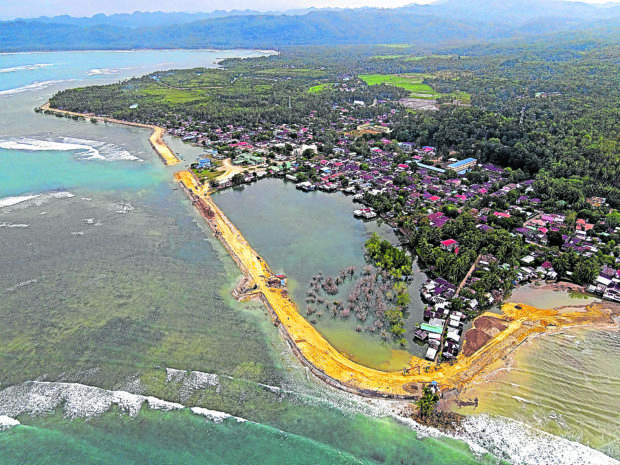DENR asked: Stop coastal road project in Surigao

‘DESTRUCTIVE’ ROAD An aerial photo of the coastal bypass road project in the town of Lianga, Surigao del Sur, now the subject of protests by residents and environmentalists for damaging the town’s mangrove area and a seagrass bed thriving with marine life. —ERWIN MASCARIÑAS
LIANGA, Surigao del Sur, Philippines — Community leaders and environmental advocates here have asked the Department of Environment and Natural Resources (DENR) to stop a coastal bypass road project that is destroying a vital part of this town’s marine ecosystem and threatens to erase its identity as a seafood town of Surigao del Sur.
The clamor was raised as the community, along with the Catholic clergy of Surigao del Sur province, observed Earth Day here on April 22 with the theme “Restore our Earth.”
Diosdado Labaso, chair of Samahan ng Mangingisda sa Lianga, said the 2.79-kilometer road threatened some 30 hectares of mangrove forest and seagrass area that served as habitat for different kinds of marine life that was gathered by locals for food.
Labaso said the large variety of shellfishes found at the seashore near the town’s Sabang River was becoming a thing of the past due to the ongoing project, which also blocked the access of the fishers from the coastal communities to the sea.
Several century-old mangrove trees that have been enclosed by the road were dying, according to Labaso.
Article continues after this advertisementHe also noted that half of the known breeding ground of shellfish were destroyed when piles of limestone began to be dumped into the shoreline to build the road.
Article continues after this advertisement“A road project is good if only they planned it accordingly that it will not affect our livelihood and [the] marine life,” Labaso lamented.
Some 1,600 Catholic Church parishioners in the town petitioned the DENR last December to have the project, implemented by the Department of Public Works and Highways (DPWH), halted. However, the DENR has yet to act on the petition, said Lianga Councilor Samuel Dollano.
Dollano, one of those spearheading the opposition to the coastal road construction, said that even as the project adversely impacted the town’s diverse ecosystem, the DPWH had not complied with the requisites for the issuance of an environmental clearance certificate, such as a consultation with the municipal council.
Disaster
Marine biologist Amor Rojas Salinas of the Center for Research on Aquamarine Life Sustainability of the Surigao del Sur State University, lamented the “disaster” created by the project.
“The completion of the project will be a marine ecosystem disaster for the town of Lianga. The area where they dump the limestone material for the construction of the road is the very same spot where there was a thick concentration of seagrass,” Salinas said.
The rich marine habitat at the project site “supported an entire ecosystem of marine life,” the reason fishers and residents could easily catch fish near the shoreline before the coastal road blocked the area, added Salinas.
Salinas explained that the death of mangrove species locally known as pagatpat was due to the altered salinity of the water, as the road has blocked ocean water from nurturing these trees.
Salinas said what used to be the town’s vast bed of healthy seagrass supported the population of juvenile rabbitfish, or danggit, blue crabs, and different species of shells, among others, for which Lianga has earned the moniker as the “seafood town” of the province.